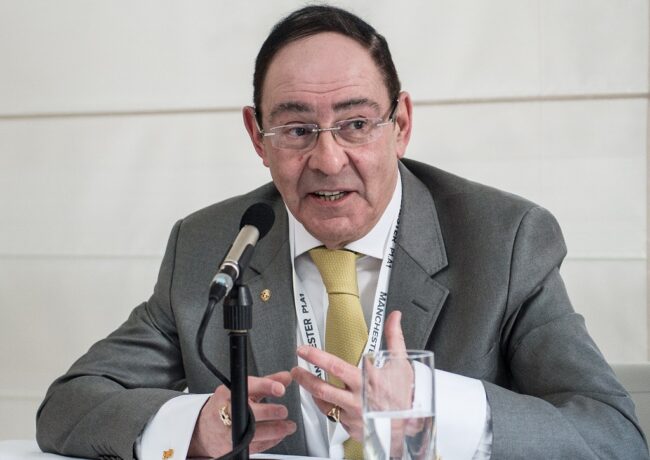Sir Howard Bernstein calls time on council career
Sir Howard Bernstein will retire from his role as chief executive of Manchester City Council in spring 2017, the council said in a statement this morning without naming a successor.
The search for a new chief executive will begin now but for many in Manchester’s business community and beyond his vision and strength of leadership may prove irreplaceable. He will be in high demand for roles in the private sector and may well have a senior development or regeneration advisory position lined up for when he leaves the local authority.
Bernstein, 63, joined the council as a junior clerk in 1971, when he went by the name Hal, and rose to become chief executive in 1998.
Senior councillors and officers were told privately ahead of the public announcement. Bernstein is still expected to attend the Manchester at MIPIM launch at KPMG’s office at One St Peter’s Square this evening, an annual gathering at which he usually addresses the property community to whip up support for the delegation to the global convention in Cannes each March, MIPIM 2017 now set to be his final one as chief executive of the council.
The council said in the statement: “He has played a central role in the regeneration and economic growth of the city, including serving from 1996-99 as the chief executive of Manchester Millennium Ltd which oversaw the transformation of the city centre in the aftermath of the 1996 IRA bombing. Since then the city has experienced unprecedented growth and investment including flagship developments such as Spinningfields, NOMA, First Street, Corridor Manchester and forthcoming investments in St John’s, Airport City, the Northern Gateway and HS2.
“He was also instrumental in securing Manchester’s hosting of the 2002 Commonwealth Games – then the largest multi-sports event ever hosted in the UK – and the catalyst to the regeneration of East Manchester and the unparalleled investment in sport and leisure facilities focused around the Etihad Campus.
“As clerk to Transport for Greater Manchester Committee -and its predecessor bodies – he has played a leading role in the introduction and expansion of the Metrolink tram network. He was also involved in the establishment of Manchester Airport as a plc in the mid 1980s and the group’s ongoing expansion.
“Sir Howard has been a key player in developing collaborative working relationships between the 10 Greater Manchester local authorities. He oversaw the establishment of the Greater Manchester Combined Authority (GMCA) in 2011 and the development of the Northern Powerhouse initiative and a series of historic devolution agreements – transferring significant powers and resources from central government to the city region and giving local leaders more scope to shape the economic success of the region and reform public services to better address Greater Manchester’s needs and priorities.
“Building on these groundbreaking agreements, he also led on the development of a Memorandum of Understanding between the Greater Manchester local authorities, NHS England and the Greater Manchester Clinical Commissioning Groups (CCGs) which secured the devolution of all health and social care funding to Greater Manchester. The agreement puts in place new partnership arrangements which will help make services more financially viable while improving outcomes for residents.”
He was knighted for his services to Manchester in 2003.
Bernstein said in a statement: “It has been a privilege to serve the city during such a pivotal period, working with many excellent people both within the council and in public and private partner organisations. I’m incredibly proud of what the city has been able to achieve in this time and to have played a part in it.
“Manchester is firmly established as a confident and dynamic place, recognised as a premier league world city although of course there are still significant challenges to address to ensure everyone who live here has the opportunity to share in, and contribute to, its growing success.
“We have a clear, shared vision for the future direction of the city – set out in the Our Manchester Strategy which takes the city up to 2025– and a strong platform from which to move forwards. But by definition this is a long-term strategy. I will have been at the Council 46 years next year and this feels like the right time to plan for my succession. There is still considerable work to do in the months ahead and my focus on it will not be diminished.
Cllr Sir Richard Leese, Leader of Manchester City Council, said: “Sir Howard is widely recognised as one of the great local government chief executives. Having someone of his talent, vision and drive dedicate his career to the city has been an undoubted plus for Manchester. Working with him over many years, addressing challenges and attempting to capture opportunities for the city, has been a pleasure.
“He will be a hard act to follow but part of his legacy will be the quality of the team, the strength of relationships and the depth of organisational ambition his successor inherits.
“Our new chief executive will need to be someone with the strategic vision, innovative ideas, partnership working skills and gravitas to help lead Manchester forwards into an exciting new phase.”
A special meeting of the council’s personnel committee will be convened shortly to begin the process of recruiting the next chief executive.





A huge loss to the region, not just Manchester. The only local government officer we have with national profile and status and track record to go with it. Liverpool would have killed to have had someone with half his ability over the past 30 years.
By John Brown
Is the scarf staying on for another year or two?
By Mizzer
Will the sponsorship deal with Cherry Bossom continue?
By Man on bicycle